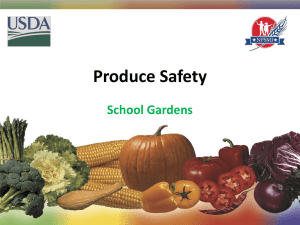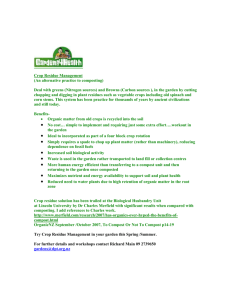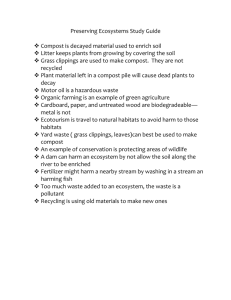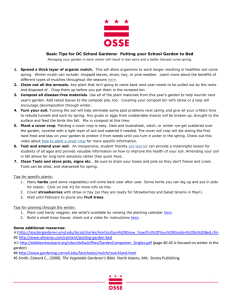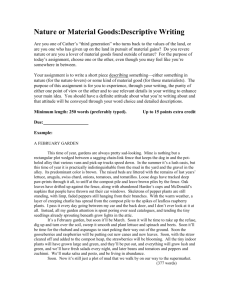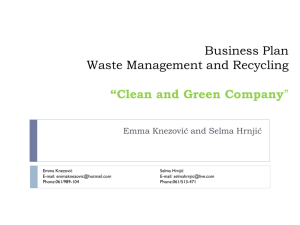Checklist for Reducing Health Risks in Community Gardens Introduction
advertisement
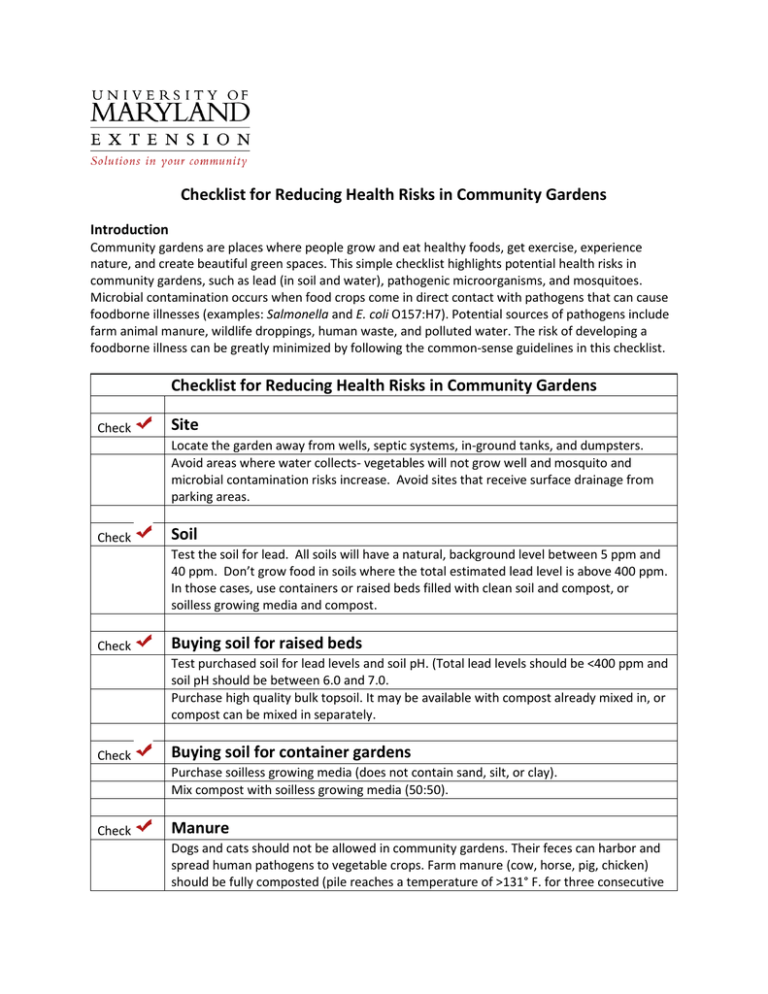
Checklist for Reducing Health Risks in Community Gardens Introduction Community gardens are places where people grow and eat healthy foods, get exercise, experience nature, and create beautiful green spaces. This simple checklist highlights potential health risks in community gardens, such as lead (in soil and water), pathogenic microorganisms, and mosquitoes. Microbial contamination occurs when food crops come in direct contact with pathogens that can cause foodborne illnesses (examples: Salmonella and E. coli O157:H7). Potential sources of pathogens include farm animal manure, wildlife droppings, human waste, and polluted water. The risk of developing a foodborne illness can be greatly minimized by following the common-sense guidelines in this checklist. Checklist for Reducing Health Risks in Community Gardens Check Site Check Soil Locate the garden away from wells, septic systems, in-ground tanks, and dumpsters. Avoid areas where water collects- vegetables will not grow well and mosquito and microbial contamination risks increase. Avoid sites that receive surface drainage from parking areas. Test the soil for lead. All soils will have a natural, background level between 5 ppm and 40 ppm. Don’t grow food in soils where the total estimated lead level is above 400 ppm. In those cases, use containers or raised beds filled with clean soil and compost, or soilless growing media and compost. Check Buying soil for raised beds Check Buying soil for container gardens Check Manure Test purchased soil for lead levels and soil pH. (Total lead levels should be <400 ppm and soil pH should be between 6.0 and 7.0. Purchase high quality bulk topsoil. It may be available with compost already mixed in, or compost can be mixed in separately. Purchase soilless growing media (does not contain sand, silt, or clay). Mix compost with soilless growing media (50:50). Dogs and cats should not be allowed in community gardens. Their feces can harbor and spread human pathogens to vegetable crops. Farm manure (cow, horse, pig, chicken) should be fully composted (pile reaches a temperature of >131° F. for three consecutive days). Apply composted farm manure in the fall. Avoid manure applications when plants are growing because edible plant parts could come into direct contact with the manure. Check Compost Check Water Check Wildlife Make compost tea only with plant-based compost (no animal manure). Wear gloves when handling compost or farm manure. Wash your hands thoroughly after handling compost. Use only drinkable (potable) water to irrigate vegetable plants. Review water quality reports from your municipal water supplier. Example: http://baltimorecity.gov/Government/AgenciesDepartments/PublicWorks.aspx for Annual Baltimore City Water Reports. Pay particular attention to the lead levels. Use caution when irrigating food gardens with water collected from the roofs of nearby buildings to. Contaminants, like animal feces, could be present on roofs and get in to collected water. Don’t sprinkle rain barrel water on leafy green vegetables. Wash all produce after harvest and before food preparation. Restrict nesting and hiding places for rats and mice by mowing the grass or other vegetation at the edges of your garden. Don’t feed birds near your garden. Wild bird feed can attract rodents. Don’t leave standing water in or near the garden. Mosquito larvae thrive in small amounts of stagnant water. Harvest produce regularly and pick up and remove rotting vegetables. Monitor the garden for fresh animal feces. Don’t harvest crops growing next to observed feces. Erect and maintain a fence around the garden to exclude wildlife. Resources: University of Maryland Extension Home and Garden Information Center (HGIC) for all gardening and pest questions and problems- http://extension.umd.edu/hgic; http://extension.umd.edu/growit • Send an e-mail question (and photos) 24/7 through the web site: http://extension.umd.edu/learn/ask-gardening • Many videos and publications are available including… o Food safety in the School Garden, factsheet (GE005) o Selecting and Using a Soil Testing Laboratory, factsheet (HG#110) o Lead in Garden Soils, factsheet (HG#18) o Soil Amendments and Fertilizers, factsheet (HG#42) FDA Food Safety Modernization Act “Final Rule on Produce Safety” http://www.fda.gov/Food/GuidanceRegulation/FSMA/ucm334114.htm Prepared by Jon Traunfeld, Extension Specialist; January, 2016
